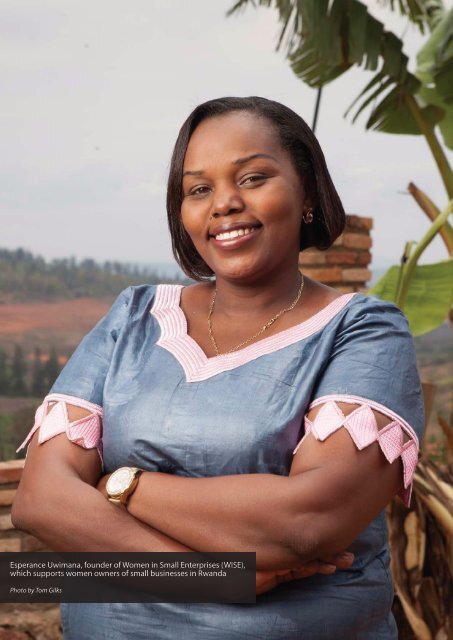EMPOWERING WOMEN BROADENING HORIZONS
Empowering-Women-Broadening-Horizons
Empowering-Women-Broadening-Horizons
Create successful ePaper yourself
Turn your PDF publications into a flip-book with our unique Google optimized e-Paper software.
Recommendations and areas for<br />
further exploration<br />
Continued evaluation<br />
Since this work began in 2014, the Mentoring Women<br />
in Business Programme has continued to refine its<br />
model and expand its reach. Though these initial<br />
cohorts of mentee-mentor graduates now represent<br />
a small sample from the programme’s overall reach,<br />
the results they achieved provide relevant insights<br />
and a valuable longitudinal view of the impact of<br />
mentoring. It would be useful to undertake further<br />
evaluation of programmatic outcomes in the future,<br />
as resources and funding allow.<br />
Programme accreditation<br />
Few mentoring programmes have formal<br />
accreditation. One of the most well-known standards<br />
is the International Standards of Mentoring<br />
Programmes in Employment (ISPME). The Cherie Blair<br />
Foundation for Women might consider carrying out a<br />
self-assessment based on the application criteria and<br />
applying for the formal award.<br />
Improvement of survey tools<br />
The baseline data taken at the application stage<br />
contained a wide range of information, but some<br />
gaps existed due to survey design and technological<br />
glitches. The Phase 2 surveys aimed to fill these<br />
gaps. The consulting team provided insights on<br />
ways to improve the programme’s surveys, which<br />
the programme has since implemented. This will aid<br />
future analysis.<br />
Mentor accreditation<br />
The vast majority of mentors do not have a specific<br />
mentoring qualification. This does not mean that they<br />
are not ideally situated to provide mentoring support,<br />
but there could be value in offering accreditation to<br />
those mentors who are interested.<br />
Communities of practice and online content<br />
Mentees and mentors suggested the continued<br />
development of communities of practice. These<br />
working groups could bring together participants to<br />
discuss different industries, geographies or challenges<br />
(e.g., running a business while navigating a divorce).<br />
Some participants seemed unaware of the range<br />
of resources offered through the online platform,<br />
which suggests the need for continued promotion of<br />
existing resources among participants and alumni.<br />
Review of non-starters<br />
For early groups, the programme did not have a<br />
mechanism to quantitatively assess factors that<br />
prevented participants from graduating. Though the<br />
programme has now established this mechanism,<br />
due to the focus on specific cohorts and funding<br />
limitations, this report did not include a review<br />
of mentees and mentors who had to leave the<br />
programme early. This would be a useful point of<br />
exploration for future analysis.<br />
Esperance Uwimana, founder of Women in Small Enterprises (WISE),<br />
which supports women owners of small businesses in Rwanda<br />
Photo by Tom Gilks<br />
33


